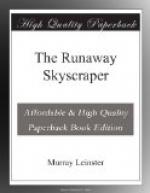There was little likelihood of Indians approaching for some days, at least, but when they did come Arthur meant to avoid hostilities by all possible means. The Indians would be fearful of their strange visitors, and it should not be difficult to convince them that friendliness was safest, even if they displayed unfriendly desires.
The pressing problem was food. There were two thousand people in the building, soft-bodied and city-bred. They were unaccustomed to hardship, and could not endure what more primitive people would hardly have noticed.
They must be fed, but first they must be taught to feed themselves. The fishermen would help, but Arthur could only hope that they would prove equal to the occasion. He did not know what to expect from them. From the hunters he expected but little. The Indians were wary hunters, and game would be shy if not scarce.
The great cloud of birds he had seen at sunset was a hopeful sign. Arthur vaguely remembered stories of great flocks of wood-pigeons which had been exterminated, as the buffalo was exterminated. As he considered the remembrance became more clear.
They had flown in huge flocks which nearly darkened the sky. As late as the forties of the nineteenth century they had been an important article of food, and had glutted the market at certain seasons of the year.
Estelle had said the birds he had seen at sunset were pigeons. Perhaps this was one of the great flocks. If it were really so, the food problem would be much lessened, provided a way could be found to secure them. The ammunition in the tower was very limited, and a shell could not be found for every bird that was needed, nor even for every three or four. Great traps must be devised, or bird-lime might possibly be produced. Arthur made a mental note to ask Estelle if she knew anything of bird-lime.
A vague, humming roar, altering in pitch, came to his ears. He listened for some time before he identified it as the sound of the wind playing upon the irregular surfaces of the tower. In the city the sound was drowned by the multitude of other noises, but here Arthur could hear it plainly.
He listened a moment, and became surprised at the number of night noises he could hear. In New York he had closed his ears to incidental sounds from sheer self-protection. Somewhere he heard the ripple of a little spring. As the idea of a spring came into his mind, he remembered Estelle’s description of the deep-toned roar she had heard.
He put his hand on the cold stone of the building. There was still a vibrant quivering of the rock. It was weaker than before, but was still noticeable.
He drew back from the rock and looked up into the sky. It seemed to blaze with stars, far more stars than Arthur had ever seen in the city, and more than he had dreamed existed.
As he looked, however, a cloud seemed to film a portion of the heavens. The stars still showed through it, but they twinkled in a peculiar fashion that Arthur could not understand.




